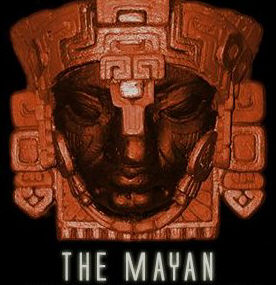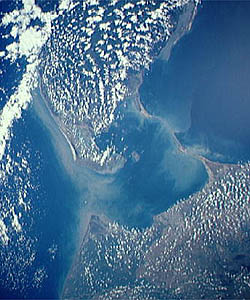
 The Atlantis
is not a hoax
The Atlantis
is not a hoaxCopyright (c) George Sipos
(The contribution presented herein was published in the Slovak journal Historická revue in June, 2004.)
Atlantis
You ask – Atlantis? What is hidden behind this mysterious word? Did this lost, mythical world really exist? Why has it been covered with so much words, veils of fantasy, half-truths, assumptions, hypotheses, or perhaps truths? Or is it just a pure fabrication that inspires poets, occultists, and a little less conventional scientists? It's hard to tell.

A pyramid in the Amazon jungle
Atlantis received a lot of attention and many words were written about it;
delusions and disinformation too. However, not only laymen but also few and
quite earnest scientists claim that this fabulous world did really exist here
some long time ago.
Atlantis and its unearthly destruction gave birth to several
theories; however, before we start speaking about them, let us look at the historically
first recorded note about the existence of this unknown world.
The first record about Atlantis was written by Plato –
a famous and trustworthy Greek philosopher – who in his works, Critias
(and Timeus, too) described in words of Critias a story about Solon, a famous
thinker and poet from the 6th century BC, who had heard in Egypt
from a certain priest that some long time ago there had existed a land called
Atlantis, which had been destroyed. A fragment of Plato's words:
Our records show how your city checked a great power,
which arrogantly advanced from its base in the Atlantic Ocean to attack the
cities of Europe and Asia. For in those days the Atlantic was navigable. There
was an island opposite the strait which you call the Pillars of Hercules (Straits
of Gibraltar), an island larger than Libya (Africa) and Asia combined; from
it travelers could in those days reach the other islands, and from them the
whole opposite continent, which surrounds what can truly be called the ocean.
For the sea within the strait we were talking about is like a lake with a narrow
entrance (the Mediterranean sea); the outer ocean is the real ocean and the
land which entirely surrounds it is properly termed continent. On this island
of Atlantis had arisen a powerful and remarkable dynasty of kings, who ruled
the whole island, and many other islands as well and parts of the continent;
in addition it controlled, within the strait, Libya up to the borders of Egypt
and Europe as far as Tyrrhenia (Italy). This dynasty, gathering its whole power
together, attempted to enslave, at a single stroke, your country and ours and
all the territory within the strait. It was then, Solon, that the power and
courage and strength of your city became clear for all men to see. Her bravery
and military skill were outstanding; she led an alliance of the Greeks, and
then when they deserted her and she was forced to fight alone, after running
into direst peril, she overcame the invaders and celebrated a victory; she rescued
those not yet enslaved from the slavery threatening them, and she generously
freed all others living within the Pillars of Hercules. At a later time there
were earthquakes and floods of extraordinary violence, and in a single dreadful
day and night all your fighting men were swallowed up by the earth, and the
island of Atlantis was similarly swallowed up by the sea and vanished; this
is why the sea in that area is to this day impassable to navigation, which is
hindered by mud just below the surface, the remains of the sunken island.
Translation by Sir Desmond Lee, first published 1965,
Penguin Classics.
According to other narrations, Gods divided the world for
themselves. Poseidon was one of them and he got the Atlantis. Some people had
already lived on the island and one of them was Evenor who had Leucippe as his
spouse; they had one daughter – Cleito. Cleito grew up, she was more and
more beautiful, and Poseidon fell in love with her. When Cleito's parents died,
the almighty God of the Sea took care of her and she was about to give birth
to five pairs of twins – men, twin brothers, who received the Atlantis
to domineer over it. The oldest one was Atlas. And these governed the big empire...
Egyptians said to Solon that Atlantis had been destroyed
some 9000 years ago. Thus, if we add 600 years (before Christ) when Solon lived,
and 2000 years that have passed from the Christ's birth until today, we will
get 11,600 years.
There are other authors who wrote about Atlantis, but the
first and most famous source is that one of Plato. The other source is a Greek
philosopher Diodorus Siculus, who lived some 90-20 years before Christ, and
who wrote (Bibliotheca Historica) that some thousands years in the past
Phoenicians had visited a very big island. Atlanteans allegedly “civilized
most of the people”. So you can see, there are more historical descriptions
of Atlantis among which we can also find the one from Aristotle, who wrote,
too, about a big island in the Atlantic Ocean. Furthermore, the destruction
of Atlantis was mentioned by historians such as Marcellinus, Timagenus, Theopompos...
We can also hear about written records of the Aztecs, Mayas,
and not only these. There are written records such as Chilam Balam, Dresden
Codex, Popol Vuh, Codex Cortesianus – they all indicate that the existence
of such an advanced civilization was possible. If we look into the line drawing of the
less distant history, Atlantis had always attracted poets, writers, but also
occultists or travelers/adventurers. One such author was Francis Bacon, who
already in 1626 wrote a very interesting work – New Atlantis,
which – at its time – surpassed even subsequent Verne's fantasies.
Bacon describes here how a shipwreck crew found some extremely advanced people
on an island in the Atlantic Ocean. The inhabitants of this island could "record
sounds", they were able to "demonstrate" and "copy" it; they used “engines”
for all types of movements; they also had messengers whom they sent to visit
the worldly nations and collect information. Readers must be captivated and
astonished – the magnetically attractive story could even outmatch any
science-fiction book of present writers… The book was written some several
hundred years before a visionary writer like Jules Verne and it can be found
in the Gutenberg Library here. Just search for the title or the
author's name.
If we look into the line drawing of the
less distant history, Atlantis had always attracted poets, writers, but also
occultists or travelers/adventurers. One such author was Francis Bacon, who
already in 1626 wrote a very interesting work – New Atlantis,
which – at its time – surpassed even subsequent Verne's fantasies.
Bacon describes here how a shipwreck crew found some extremely advanced people
on an island in the Atlantic Ocean. The inhabitants of this island could "record
sounds", they were able to "demonstrate" and "copy" it; they used “engines”
for all types of movements; they also had messengers whom they sent to visit
the worldly nations and collect information. Readers must be captivated and
astonished – the magnetically attractive story could even outmatch any
science-fiction book of present writers… The book was written some several
hundred years before a visionary writer like Jules Verne and it can be found
in the Gutenberg Library here. Just search for the title or the
author's name.
The alleged bridge between India
and Sri Lanka mentioned in the Indian epos Ramayana (satellite picture).
Certainly, many literary sources
contributed to multiplication of interests in lost worlds and Atlantis later
became a good source of profit – this mythical and mysterious topic was
grasped by clairvoyants and occult movements, either by groups or individuals
of the New Age movement, which popularized this “continent”. Occultism
and New Age also drew information from the famous Russian clairvoyant –
Blavatska, who maintained that people from Atlantis were just a different race
on Earth with amazing psychical abilities. However, being corrupted, they changed
themselves to bad magicians and started war that resulted in their complete
destruction.